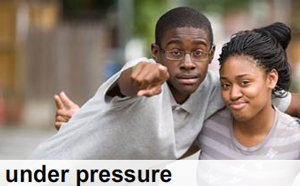Black teens fight pressures of pre-marital sex
By Starla Muhammad -Staff Writer- | Last updated: Oct 6, 2011 - 9:22:48 PMWhat's your opinion on this article?

Survey results can be found in the October issue of ESSENCE or on http://TheNationalCampaign.org
|
While the pregnancy rate among Black teens has dropped 44 percent over the last several years from 224 per 1,000 in 1990 to 126 per 1,000 in 2006, it is still higher than pregnancy rates for White and Hispanic teens says the 15-page report, “Under Pressure: What African-American Teens Aren't Telling You About Sex, Love, and Relationships,” which summarized survey results.
The reduction in pregnancy is encouraging but Black teens ages 13-19 still account for 69 percent of reported HIV/AIDS cases among all teens in 2006 according to a Henry J. Kaiser Family Foundation fact sheet.
Forty-seven percent of teens in the survey say they have been pressured to go further sexually than they wanted to, 40 percent say they had sex with someone and 34 percent say they did everything but sex with someone.
The survey results were not surprising to Tameka Starr, program director for Daughters of Virtue and Excellence (D.O.V.E) a mentoring and leadership organization for Black teen girls ages 14-18 based in Atlanta, Ga.
“(Teen girls) are at that age that they want boyfriends so it's harder for them to have those relationships because then when they do meet somebody, the boys are pressuring them to do things that are really degrading to them (like) meet them under the staircase. They want to do things inside the school… I've told the girls just don't ever disrespect yourself in that way and if a boy feels that's what you have to do in order for him to be in your life, then that's not who you need in your life,” Ms. Starr told The Final Call.
The pressure is not just felt by teen girls as 54 percent of Black males in the survey say they also feel pressure from their peers to have sex. Bryan Echols, executive director of the Chicago-based Metropolitan Area Group for Igniting Civilization (MAGIC), a group that mentors Black teens says the feeding of hyper sexualized, hyper masculine images by mass media contributes to the pressure felt by teen boys.
Images of a man with a lot of women that is very physically aggressive are media stereotypes that say this is the example of manhood, Mr. Echols explains. “The boys are thinking, ‘I gotta be like that' and maybe that kid has never had a conversation about sex and the only thing that he's hearing is from his boys and his boys probably never even engaged,” says Mr. Echols.
Mr. Echols says if Black boys see positive images, whether in media or in real life, it can begin to counter some of the pressure they feel to have sex. “I know that if I can see a Black man who gets up, goes to work everyday, loves his wife, loves his children and he does it everyday then I can be that man right? It's tangible,” says Mr. Echols.
Many teenagers today “go with the status quo” when it comes to what their peers may be doing, says Ms. Starr, so she encourages them to become independent thinkers by not being afraid to go against the “popular” thing to do. “We have to expose them to different things to open up their minds and get them to see that there's a lot more out there than what's going on right there in their immediate environment,” she adds. Engaging Black teens in community service projects and positive activities in and out of school is key, says Ms. Starr.
Sixty-four percent of teen respondents agreed that the media sends messages that it is okay for Black men to cheat in relationships, 73 percent say media portrays Black youth as sexually aggressive and 72 percent believe media sends the message that the most important quality of Black females is their sex appeal.
However the survey also revealed despite negative media portrayals, mixed messages and peer pressure, 92 percent of the teens expected they would be successful. This speaks to how astute and observant Black teens are, says ESSENCE Senior Health Editor Lynya Floyd.
“They're not passively absorbing the storyline and characters presented to them on television. They're actively analyzing them,” says Ms. Floyd in an email response to questions sent by The Final Call.
The results show there is still some problem-solving work to do since Black teens are still feeling pressured, she added. “… it's not just telling your kids, ‘Don't have sex' It's explaining to them how to get out of sexual situations where they feel pressured or confused,” says Ms. Floyd.
(Survey results can be found in the October issue of ESSENCE or on www.thenationalcampaign.org.)
Related news:
America's sex-mad culture (FCN, 05-28-2008)
INSIDE STORIES AND REVIEWS
-
-
About Harriett ... and the Negro Hollywood Road Show
By Rabiah Muhammad, Guest Columnist » Full Story -
Skepticism greets Jay-Z, NFL talk of inspiring change
By Bryan 18X Crawford and Richard B. Muhammad The Final Call Newspaper @TheFinalCall » Full Story -
The painful problem of Black girls and suicide
By Charlene Muhammad -National Correspondent- » Full Story -
Exploitation of Innocence - Report: Perceptions, policies hurting Black girls
By Charlene Muhammad -National Correspondent- » Full Story -
Big Ballin: Big ideas fuel a father’s Big Baller Brand and brash business sense
By Bryan Crawford -Contributing Writer- » Full Story






 Click Here Stay Connected!
Click Here Stay Connected!








